|
|
|
Sort Order |
|
|
|
Items / Page
|
|
|
|
|
|
|
| Srl | Item |
| 1 |
ID:
122396
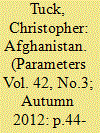

|
|
|
|
|
| Publication |
2012.
|
| Summary/Abstract |
Why has ending the war in Afghanistan proved to be so problematic? In
theory, the decision to end a war should be relatively straightforward.
One or more of the belligerents determine whether or not it is worth continuing the conflict and, as long as at least one of them decides that continuing to
fight is not worth the investment, peace is offered and the conflict terminates.
Clausewitz encapsulates this rational, commonsense approach to the ending
of war when he asserts: "Once the expenditure of effort exceeds the value of
the political object, the object must be renounced and peace must follow."1
By
this logic, and in the context of Afghanistan, the strategic dilemma associated
with how and when to end the war could have been avoided by engaging in a
rational cost-benefit analysis: how much has the war cost and what is the value
of the objectives we were pursuing? Once the former exceeded the latter, then
the Coalition should have struck a deal with the Taliban and left Afghanistan.
Instinctively, of course, we know that the decisions involved in ending a war
cannot be as simple as this rational cost-benefit analysis. But, why is that so?
|
|
|
|
|
|
|
|
|
|
|
|
|
|
|
|
| 2 |
ID:
122392
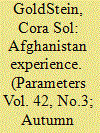

|
|
|
|
|
| Publication |
2012.
|
| Summary/Abstract |
On 7 October 2001, the Bush administration launched Operation Enduring
Freedom (OEF) to dislodge al Qaeda forces, neutralize the Taliban in
Afghanistan, and decapitate their respective leadership. President Bush insisted
that the United States was not at war with the Afghan people or with Islam,
and the Afghan civilian population was not identified as the enemy. Therefore,
the Pentagon attempted to minimize civilian casualties. OEF toppled the
Taliban regime, but did not eliminate the Taliban influence in Afghanistan. The
Taliban, although expelled from power, still preserved connections with the
rural Pashtun.
|
|
|
|
|
|
|
|
|
|
|
|
|
|
|
|
| 3 |
ID:
122391


|
|
|
|
|
| Publication |
2012.
|
| Summary/Abstract |
As our current wars in Iraq and Afghanistan wind down, political deliberations in this country return to a familiar pattern. Intent on "not re-fighting
the last war," a debate about future military strategy dominates the discussion. As in the past, the debate is sharpened by a budget ax suspended over
the Department of Defense. The services anticipate funding cuts so deep as
to allow for only one strategic approach to survival. And, as in the past, many
approach the problem as bureaucrats defending turf, rather than as strategists
objectively creating a military that will best serve the nation.
|
|
|
|
|
|
|
|
|
|
|
|
|
|
|
|
| 4 |
ID:
122393
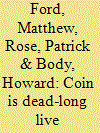

|
|
|
|
|
| Publication |
2012.
|
| Summary/Abstract |
Donald Rumsfeld was right. Force transformation works. The techniques
that led to the initial victories in Afghanistan in 2001 were precisely those
that produced success in Libya in 2011.1
Small-scale deployments of special
forces backed by precision strike and deep attack capabilities used to support an
allied indigenous armed group proved an effective military tool for achieving
specific strategic outcomes. In contrast, the results of large-scale troop deployments as part of counterinsurgency (COIN), stabilization and nation-building
activities over the past 1ten0 years in Iraq and Afghanistan have been less definitive. Despite intensive investment in blood, treasure, and military effort, the
precise long-term outcomes of these two campaigns remain unclear and will
be open to debate for years to come. This challenging operational experience
has, however, highlighted some necessary and enduring truths about the use of
military force. Despite great advances in military technology and the increasing
sophistication with which organized violence can be applied in a range of situations, all warfare remains characterized by uncertainty; there exists no silver
bullet that can guarantee enduring political success from the barrel of a gun.2
|
|
|
|
|
|
|
|
|
|
|
|
|
|
|
|
| 5 |
ID:
122397
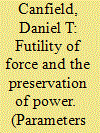

|
|
|
|
|
| Publication |
2012.
|
| Summary/Abstract |
I
n the spring of 1763 Great Britain, basking in the warm afterglow of decisive
victory in the Seven Years War, presided over a vast and unprecedented
global empire. The small island nation seemingly, and rather suddenly, found
itself without peer-enjoying a level of military and political hegemony not
seen since the days of the Roman Empire.2
It was a unique, albeit fleeting,
position. In the span of a mere twenty years, the world's preeminent global
power, despite enjoying a considerable advantage in almost every conceivable category used to calculate military potential, found itself disgraced and
defeated by a start-up nation possessing a markedly inferior conventional military capability. Crippled by a grossly burgeoning national debt, diplomatically
isolated, and politically divided at home, the North Ministry became embroiled
in a protracted and unpopular global war that its policymakers and military
leaders seemed incapable of understanding-much less winning-until it was
far too late.3
|
|
|
|
|
|
|
|
|
|
|
|
|
|
|
|
| 6 |
ID:
122398
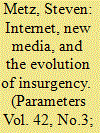

|
|
|
|
|
| Publication |
2012.
|
| Summary/Abstract |
I
nsurgency, like war, has an enduring nature and a changing character. It
remains a strategy entailing violence used by the weak and desperate against
a power system.1
Often (but not always), this pits a nonstate or proto-state organization against a state. Out of weakness, the organization using a strategy of
insurgency attempts to shift the focus of conflict away from domains where the
state or other power structure is particularly strong, particularly the conventional military. Insurgents seek to make domains decisive where morale and
other psychological characteristics matter more than tangible power, recognizing these characteristics even the odds to a certain extent. The enduring nature
of insurgency includes three core functions: an insurgency must survive, it must
strengthen itself, and it must weaken the power structure or state.
|
|
|
|
|
|
|
|
|
|
|
|
|
|
|
|
|
|
|
|
|